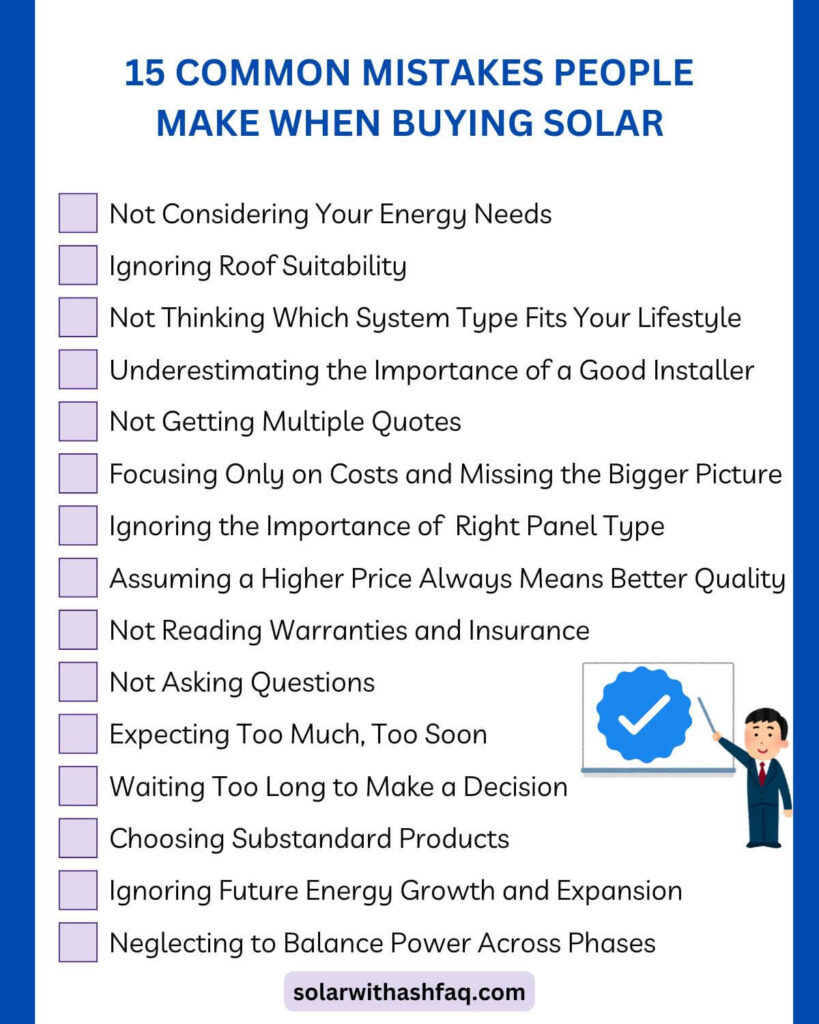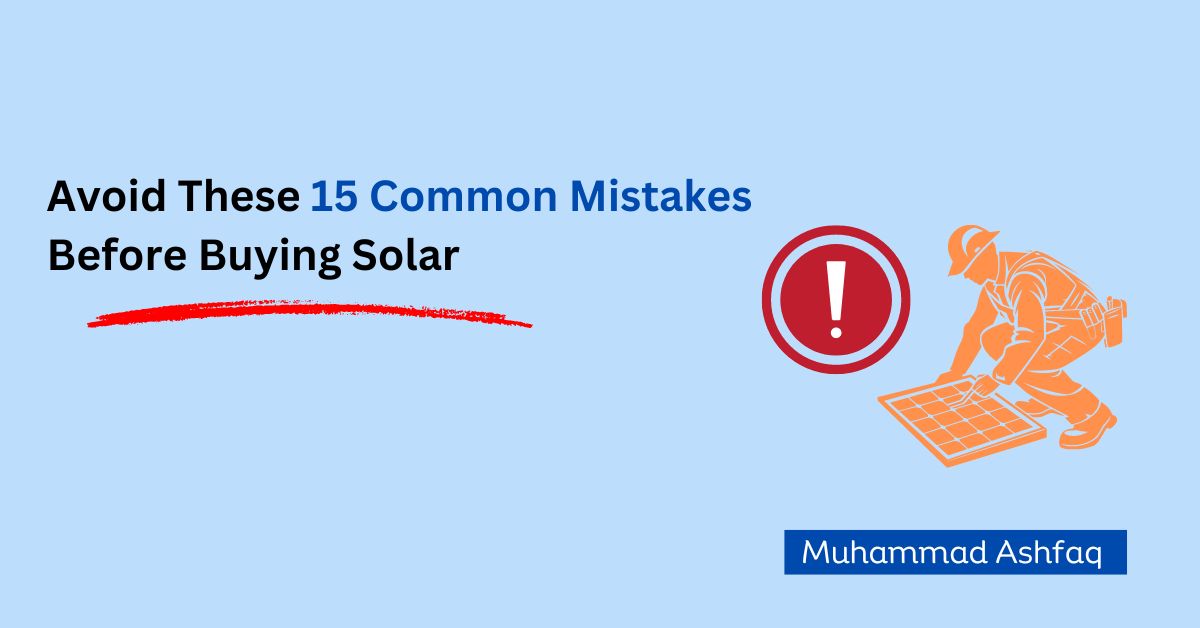Avoid These 15 Common Mistakes Before Buying Solar
Buying a solar system is like planting a tree for your home’s future—it’s a great step, but it needs to be done right!
If you’re not careful, small mistakes can lead to wasted money and a solar setup that doesn’t suit your energy needs.
And remember! Picking the wrong size solar system is like buying shoes that don’t fit.
In this guide, I’ll walk you through 15 common mistakes people make when going solar—and how you can avoid them.
Let’s get you started on a smooth solar journey!
Not Considering Your Energy Needs
When buying a solar system, one of the most critical mistakes to avoid is not considering your energy needs.
If you underestimate your energy needs, you may purchase a solar system that is too small to meet your home demands.
Conversely, overestimating your needs results in purchasing an unnecessarily large system, leading to higher costs.
To ensure you choose the right solar system, consider the following steps:
- Review Your Energy Bills
- Consider Seasonal Variations
- Consult with Professionals
- Use Solar Calculators
Ignoring Roof Suitability
Ideally speaking, roofs should face south (in the northern hemisphere) to maximize sunlight exposure.
For that, your roof must have enough unobstructed space to accommodate the necessary number of solar panels.
Factors such as chimneys, ducts, billboards, and shading from trees or nearby buildings can limit the usable space and reduce energy production.
Also, solar panels add significant weight to your roof, so it’s important to ensure that your roof can safely support this additional load.
Not Thinking About Which Solar System Type Fits Your Lifestyle
There are primarily three types of solar power systems: grid-tie, off-grid, and hybrid. Each type serves different needs and lifestyles:
Grid-Tie Solar Systems
These systems are connected to the local utility grid. They allow people to use solar energy while still being able to draw power from the grid when needed.
This system is ideal for those who live in areas with reliable grid access and want to take advantage of net metering.
Off-Grid Solar Systems
These systems are completely independent of the utility grid and require battery storage to store energy for use when solar production is low (e.g., at night or during cloudy days).
This system is suitable for off-grid cabins or homes in rural locations where connecting to the grid is not feasible.
Hybrid Solar Systems
Hybrid systems combine features of both grid-tie and off-grid systems. People who want the flexibility of using solar energy while having a backup during load-shedding.
This system is ideal for those who want to maximize their solar investment and ensure energy availability during grid failures.
Underestimating the Importance of a Good Installer
A professional solar installer brings experience to the table.
The quality of the installation directly affects the performance of the solar system. Poor installation can lead to issues such as
- Leaks
- Electrical failures
- And reduced energy output.
Furthermore, solar installations involve working with electricity and potentially hazardous materials.
Professional installers are trained to handle these risks safely, reducing the likelihood of accidents or damage during the installation process.
Not Getting Multiple Quotes
Every home has unique energy needs. By receiving multiple quotes, you can explore diverse solutions and understand what each installer offers at what cost.
It’s important to ensure that you are comparing similar systems, as one quote may include a higher kilowatt (kW) system with fewer panels, while another may offer a lower kW system with more panels.
Each installer may propose different brands of solar panels, inverters, and warranties. By obtaining multiple quotes, you can assess the quality of the products and services offered.
Here is why I like multiple quotes: If you prefer one installer but receive a lower quote from another, you can use that information to negotiate a better price.
Reading reviews and seeking references can help you gauge the professionalism and reliability of each installer.
Focusing Only on Upfront Costs and Missing the Bigger Picture
It’s essential to consider the bigger picture when making a solar investment.
While the initial costs may be high, the energy savings you’ll enjoy over the years can far outweigh the initial investment.
Also, factor in the increased home value with solar. The increased value can be as much as 4.1% on average.
By focusing on the total cost of ownership rather than just the initial investment, you ensure that you make the most of your solar energy investment.
Expecting Too Much, Too Soon
People should focus on the overall return on investment (ROI) rather than expecting immediate financial relief.
This includes considering the accumulative savings over the lifespan of the system, which can be 25 years or more.
Many people overlook available incentives (net metering) and government schemes when calculating potential savings.
This approach will help maximize the benefits of solar energy and ensure a more satisfying experience overall.
Not Reading Warranties and Insurance Policies
Solar systems commonly come with several types of warranties, each covering different aspects:
- Product Warranty
- Performance Warranty
- Inverter Warranty
- Workmanship Warranty
It is important to familiarize yourself with the process for making warranty claims.
Including any documentation needed and the timeframes involved. This knowledge can save time and frustration if issues arise at a later stage.
By taking the time to review these documents carefully, you can ensure that you are fully informed about your rights and responsibilities.
Assuming a Higher Price Always Means Better Quality
While it is true that higher-priced solar products often come with better materials and technology, this is not a universal rule.
Established brands may charge more due to their reputation and proven track record. However, newer brands might offer competitive pricing without compromising quality.
Sometimes, a higher price may include extra services or features that you might not need. For example, some quotes may add long warranties or fancy monitoring systems that can raise the cost without giving you much extra value for your home.
Not Asking Questions
If you don’t ask questions, you may end up with a system that doesn’t sufficiently meet your requirements.
By asking detailed questions about the quote, you can clarify what is included, such as equipment costs, installation fees, warranties, and any additional services.
Inquire about their track record, the number of installations they have completed, and customer references. This information is vital for assessing whether you are choosing a reputable company or not.
Ignoring the Importance of Choosing the Right Panel Type
Choosing the wrong type of solar panel can greatly reduce the effectiveness of your solar system.
Result? This affects both energy production and overall return on investment.
Monocrystalline panels are known for their high efficiency (typically 20-22%) and sleek appearance but tend to be more expensive.
Polycrystalline panels are more affordable and provide decent efficiency (around 15-20%), though they require more space for the same energy output.
For insights on picking the right solar panels, see my Solar Panel Types Guide.
Waiting Too Long to Make a Decision
The longer you wait to install solar panels, the more potential savings you lose.
Because delaying installation means continuing to pay ever-increasing prices for electricity.
Many regions offer incentives, tax credits, and rebates for solar installations. However, these incentives may change or expire.
As more homeowners adopt solar energy, demand for installations can increase and result in higher prices due to increased demand.
Ignoring Future Energy Growth and Expansion
Many buyers overlook their future energy needs. As families grow, energy consumption also rises significantly.
To avoid outgrowing your solar system, plan for future expansion by installing a slightly larger system.
Additionally, always opt for a higher-capacity inverter, even if you start with a smaller system.
This way, if you add more panels in the future, the inverter can handle the load, keeping the upgrade costs low.
Choosing Substandard Products
Substandard products often come without reliable warranties or after-sales support. In the event of failure, you may find yourself facing out-of-pocket expenses without an alternative from the original supplier.
Also, substandard solar panels use low-quality materials that reduce energy output.
This inefficiency means that you need to install more panels to meet their energy needs.
Moreover, many low-quality solar systems lack essential safety features, such as overcharge and over-discharge protection.
Neglecting to Balance Power Across Phases
If your home load is three phases then this check is the most important.
If power is not evenly distributed across the phases, some phases experience overload while others are underutilized.
This leads to increased line losses and decreased overall efficiency of the solar system.
Phase balancing is critical for solar inverters because they are designed to handle balanced loads across all phases.
If one phase is overloaded while others are underutilized, the inverter’s performance can suffer.

Final Remarks
By avoiding these common mistakes, you’ll set yourself up for a smooth and successful solar experience.
With the right choices, you’ll enjoy lower energy bills and the peace of mind that comes with a system built to last.
Now that you know what to watch out for, you’re ready to make the most of your solar setup.
FAQS
Getting multiple quotes helps homeowners understand the market and avoid overpaying. It also allows them to compare the quality of equipment and services offered by different installers.
DIY installation can be risky and may void warranties. It’s best to hire professional installers to ensure proper setup and safety.
Get multiple quotes from reputable installers, understand financing options, and avoid being upsold on unnecessary equipment or oversized systems.
One of the biggest mistakes is focusing solely on price, without considering the quality and efficiency of the solar panels.
Ensure your roof gets adequate sunlight, is structurally sound, and has the right angle and orientation for maximum efficiency.

Content Writer | Assistant Manager (Electrical) at IESCO
As a passionate content writer, I’m on a mission to make solar hassle-free for you through my expert guides and easy-to-digest content.

